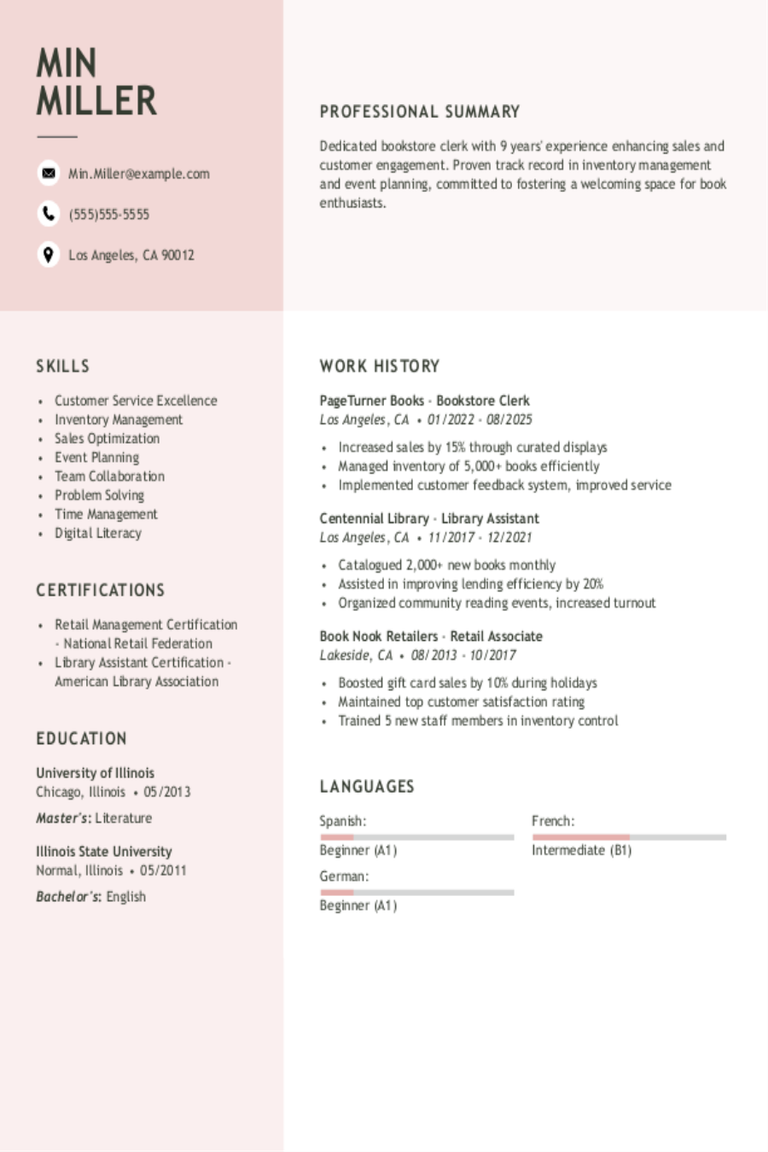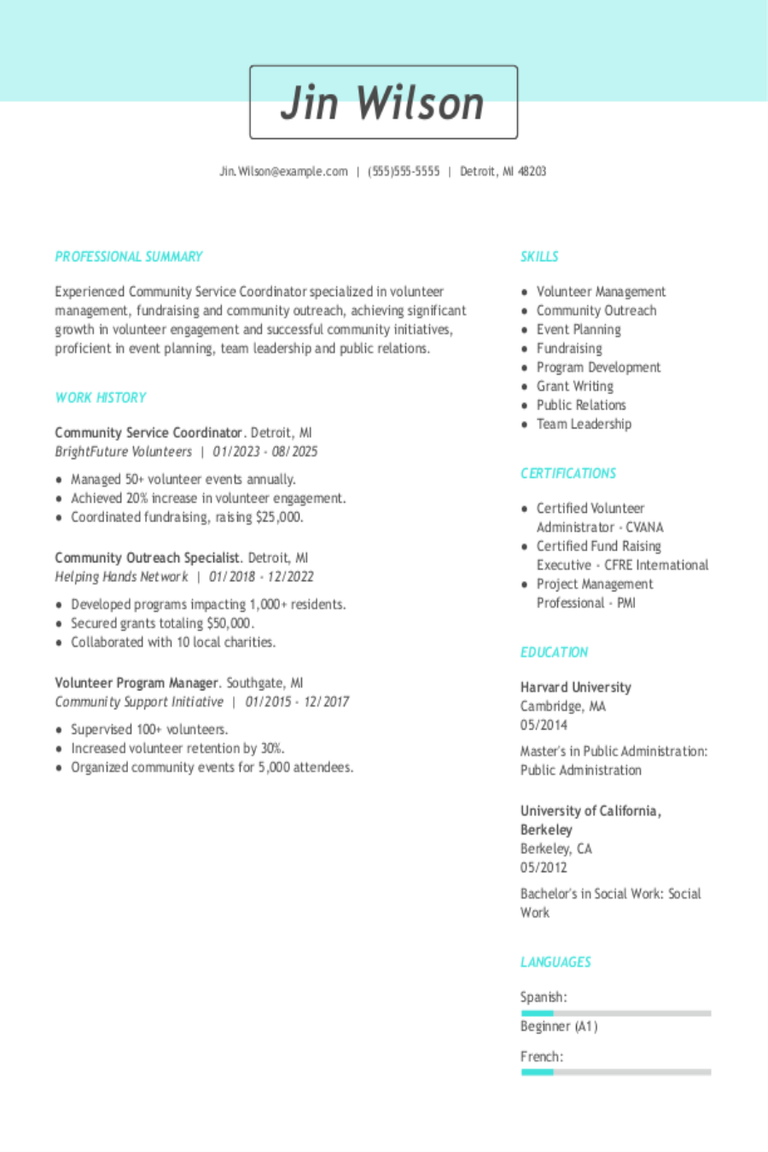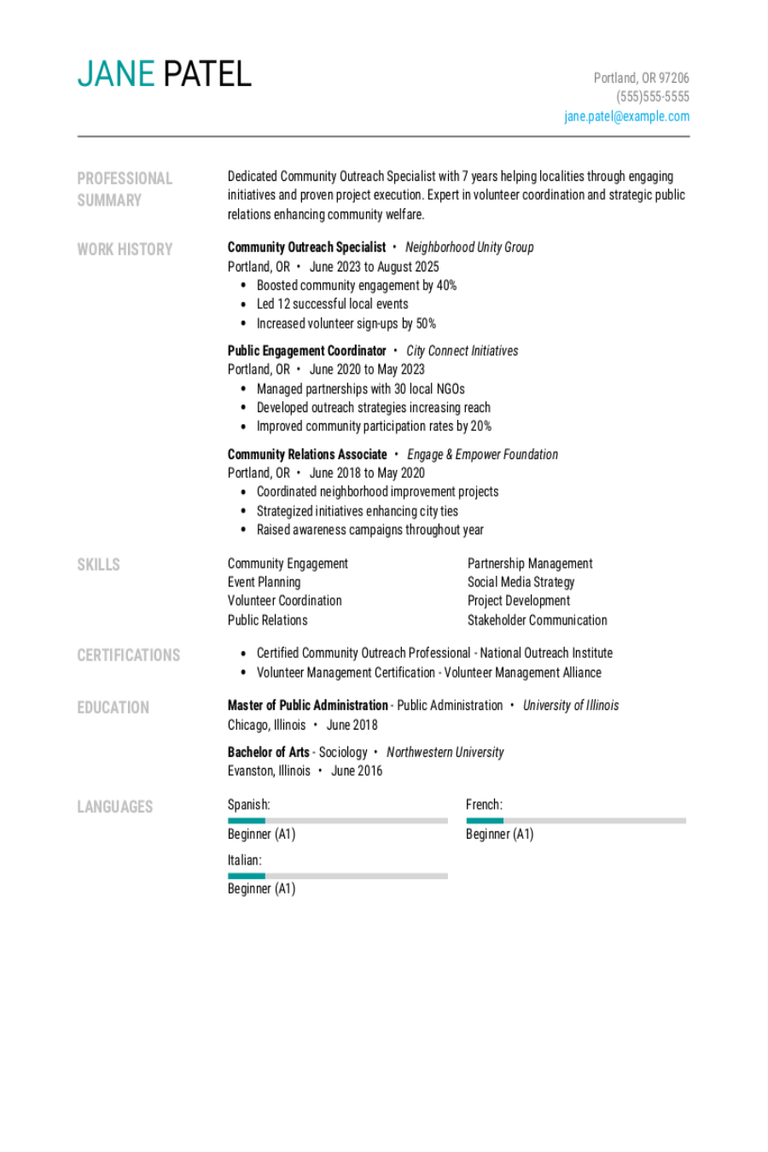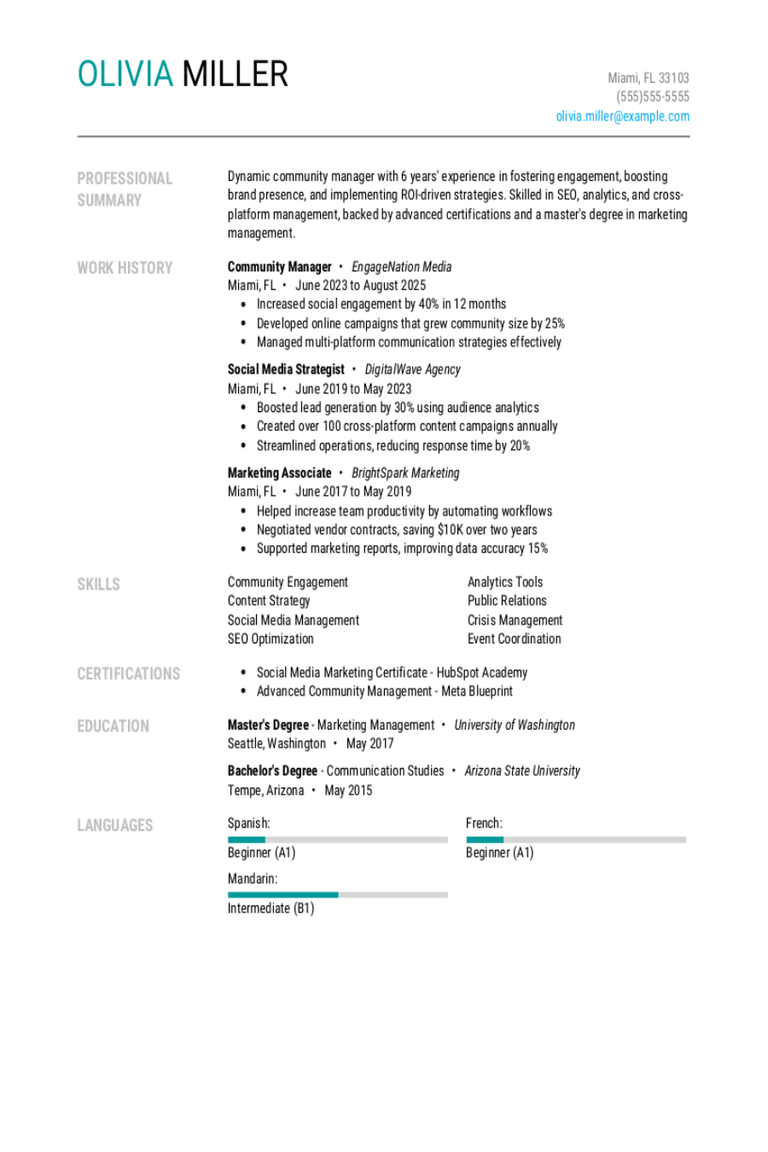Table of Contents
Get started with MyPerfectResume today!
- Build a resume on any device
- Pick an ATS-friendly template
- Tailor with AI copy suggestions
Why this resume works
- Highlights industry-specific skills: By integrating administrative skills like patient scheduling and medical records management, the applicant showcases their fit for healthcare roles.
- Quantifies accomplishments: Using real metrics, such as reducing filing errors by 20%, the applicant’s resume emphasizes impact through quantifiable achievements.
- Illustrates problem-solving ability: Implementing a new system that reduced errors highlights critical thinking and innovation, illustrating strong problem-solving skills within administrative tasks.
More Unit Clerk Resume Examples
Browse these unit clerk resume examples to discover how to highlight your organizational skills, healthcare knowledge, and administrative experience. Use these samples to help you create a resume that stands out to employers.
Entry-level unit clerk
Why this resume works
- Centers on academic background: By highlighting advanced academic preparation, the applicant emphasizes a strong foundation critical for early career development.
- Puts skills at the forefront: A skills-based resume format efficiently showcases the applicant’s expertise in medical record management and patient appointment scheduling.
- Places contact information prominently: A professional resume header is essential for callbacks, providing quick access to contact information and establishing credibility right from the start.
Mid-level unit clerk
Why this resume works
- Points to measurable outcomes: By maintaining 95% accuracy in patient records and improving office efficiency by 50%, the applicant showcases a strong commitment to measurable outcomes in healthcare administration.
- Demonstrates language abilities: Multiple language skills in Spanish, French, and German bolster the applicant’s ability to engage with diverse patient populations and improve cross-cultural communication.
- Displays technical expertise: Being a Certified Healthcare Administrative Professional and Electronic Health Records Specialist shows the applicant’s technical expertise important for seamless healthcare operations.
Experienced unit clerk
Why this resume works
- Lists relevant certifications: By listing certifications like Certified Healthcare Administrative Professional, the applicant emphasizes a strong foundation in healthcare administration and a dedication to continuous learning.
- Showcases impressive accomplishments: The applicant’s accomplishments, such as improving patient flow by 50%, show an ability to drive efficiency and impact team performance significantly.
- Sections are well-organized: With clear headers and concise bullet points, the resume is structured for easy scanning, making information accessible and highlighting key skills effectively.
Unit Clerk Resume Template (Text Version)
Olivia Zhang
Parkview, MO 64163
(555)555-5555
Olivia.Zhang@example.com
Professional Summary
Detail-oriented Unit Clerk with 7 years in healthcare admin. Proven record in efficient patient scheduling and data management. Skilled in leading teams and implementing robust office systems with high accuracy.
Work History
Unit Clerk
Springfield General Hospital – Parkview, MO
March 2023 – August 2025
- Managed patient records with 99% accuracy.
- Coordinated schedules for 50+ staff daily.
- Implemented new filing system reducing errors by 20%.
Medical Office Assistant
Riverside Medical Group – St. Louis, MO
February 2019 – February 2023
- Streamlined patient check-in process by 40%.
- Handled billing inquiries, reducing complaints by 30%.
- Assisted in managing 100+ patient appointments weekly.
Healthcare Administrative Assistant
Harmony Health Center – Parkview, MO
January 2016 – January 2019
- Improved patient data entry speed by 25%.
- Ensured compliance with regulatory standards.
- Reduced patient wait times by implementing a new system.
Languages
- Spanish – Beginner (A1)
- French – Intermediate (B1)
- German – Beginner (A1)
Skills
- Healthcare Administration
- Patient Scheduling
- Medical Records Management
- Data Entry
- Team Coordination
- Billing and Coding
- Regulatory Compliance
- Office Management
Certifications
- Certified Medical Administrative Assistant – National Healthcareer Association
- CPR/First Aid – American Red Cross
Education
Master of Health Administration Health Services Administration
University of Illinois at Springfield Springfield, Illinois
May 2016
Bachelor of Science Biology
Vanderbilt University Nashville, Tennessee
May 2014
Related Resume Guides
- Bank Clerk
- Bilingual Receptionist
- City Clerk
- Contract Administrator
- Data Entry Clerk
- Desktop Support Engineer
- Document Controller
- Document Specialist
- Executive Assistant
- Facilities Coordinator
- Facilities Manager
- Front Desk Clerk
- Front Office Assistant
- Front Office Executive
- Gym Receptionist
- Medical Billing
- Medical Billing And Coding
- Medical Office Assistant
- Medical Receptionist
- Office Administrator
- Office Assistant
- Office Manager
- Personal Assistant
- Procurement Analyst
- Procurement Officer
- Project Coordinator
- Receptionist
- Secretary
- Store Assistant
Advice for Writing Your Unit Clerk Resume
Learn how to write a resume that highlights your administrative skills, attention to detail, and ability to manage medical records efficiently. Whether you’re just starting out or looking to update your current resume, we’ve got you covered with practical advice tailored specifically for unit clerks.

Write a strong professional summary
A professional summary on a resume serves as an introduction to hiring managers, offering a quick snapshot of your qualifications. It’s important because it helps them decide whether to keep reading or move on. Choose between writing a summary or a resume objective based on your experience level.
A professional summary is typically three to four sentences that highlight your experience, skills, and achievements. It’s best for those with relevant work history, like experienced unit clerks aiming to showcase their professional identity and the value they bring to the role.
In contrast, resume objectives focus on career goals and are suited for entry-level applicants, career changers, or those with gaps in employment. While summaries emphasize “what I’ve accomplished,” objectives focus on “what I aim to contribute.”
Next, let’s go through examples of both summaries and objectives tailored for various levels of experience, helping you craft a compelling introduction no matter where you are in your career journey.
Unit clerk resume summary examples
Entry-level
Recent healthcare administration graduate with a strong foundation in medical terminology and administrative skills. Completed an internship as a unit clerk where tasks included managing patient records and coordinating communication between departments. Certified in Microsoft Office Suite and committed to supporting healthcare teams with accuracy and efficiency.
Mid-career
Unit clerk with over six years of experience in busy hospital environments, adept at handling patient admissions, discharges, and maintaining electronic health records. Known for streamlining clerical processes and improving team collaboration. Holds a certificate in medical billing and coding, bringing strong organizational skills to support efficient unit operations.
Experienced
Seasoned unit clerk with 15+ years specializing in high-volume emergency room settings. Proven track record of improving workflow efficiency through leadership roles in administrative coordination. Expert in implementing new digital record systems leading to significant reductions in processing time. Committed to fostering a supportive environment for healthcare professionals and patients alike.
Unit clerk resume objective examples
Recent graduate
Detail-oriented recent graduate with an associate degree in health administration seeking an entry-level unit clerk position. Eager to use administrative skills and knowledge of medical terminology to support healthcare teams and improve patient care efficiency.
Career changer
Dedicated professional transitioning from retail management to healthcare, aiming for a unit clerk role to leverage organizational abilities and customer service experience. Aspires to contribute effectively to a medical team by ensuring smooth administrative operations and improving patient interactions.
Entry-level applicant
Ambitious individual with a strong interest in healthcare administration pursuing a unit clerk position. Excited to apply newly acquired skills in data entry, scheduling, and communication within a dynamic medical environment while supporting staff and facilitating excellent patient care.
Use a Resume Builder to quickly create a professional-looking resume that highlights your skills as a unit clerk, making it easy for hiring managers to see why you’re the right fit.
Include relevant certifications and training
Listing certifications and training is important for a unit clerk because it shows you have the skills needed for the job. In jobs that require technical skills, like being a unit clerk, having certifications can make you stand out. It proves you’ve taken special courses and passed tests to show your knowledge.
By creating a certifications section on your resume, you can highlight these achievements clearly. Commonly sought-after certifications for a unit clerk include:
- Medical Terminology Certification
- Basic Life Support (BLS) Certification
- Health Unit Clerk Certificate
- Electronic Health Records (EHR) Training
- HIPAA Compliance Training
These certifications help show you’re ready for the job of a unit clerk. They demonstrate that you understand medical terms and know how to use health records systems safely. This makes employers more confident in your ability to handle important tasks in healthcare settings.
Example of a certifications section
Medical Terminology Certification
Issued by: American Health Information Management Association (AHIMA)
Issued 2023
Certified Unit Clerk
Issued by: Healthcare Information and Management Systems Society (HIMSS)
Expires 2025
Electronic Health Records Specialist Certification
Issued by: National Healthcareer Association (NHA)
Expires 2026
Choose a resume template with a simple, professional design rather than an overly decorative one. This approach ensures you present a polished image that can set you apart.
Showcase your work experience
Highlighting relevant work experience on your resume is important for a unit clerk role because it showcases your ability to manage job responsibilities effectively. This section allows employers to quickly assess what you’ve accomplished in similar roles and determine how you can be an asset to their team.
Start by listing experiences in reverse-chronological order, beginning with your most recent position. Make sure each entry includes the job title, employer name, location, and employment dates. This format provides clarity, helping employers easily follow your career trajectory and understand your growth over time.
When detailing your work experience, use concise, action-oriented language to emphasize what you achieved. Highlight measurable results that demonstrate your contributions in prior positions. For instance, instead of stating “responsible for patient records,” opt for “managed over 100 patient records weekly with 99% accuracy,” which offers a clearer depiction of your impact.
Include core duties that illustrate the skills necessary for a unit clerk position, such as:
- Managing patient information
- Scheduling appointments
- Coordinating staff communication
- Maintaining office supplies
In conclusion, organizing your work experience thoughtfully helps potential employers see how you would integrate into their organization as a unit clerk. Use this section to narrate a story of development and capability by emphasizing specific achievements and key responsibilities from previous roles.
5 unit clerk work history bullet point examples
- Coordinated daily patient admissions and discharges, improving department efficiency by 25%.
- Managed electronic health records for over 200 patients weekly, reducing data entry errors by 40%.
- Facilitated communication between medical staff and patients, improving service satisfaction scores by 15%.
- Implemented a new scheduling system that decreased appointment wait times by 30%.
- Trained 10 new clerks in departmental procedures, increasing team productivity by 20%.
When applying for a unit clerk position, select a resume format that highlights your organizational skills and experience with medical records first.
Match your resume with the job description
Tailoring your resume to the job description is essential because it helps you stand out and ensures your application passes through applicant tracking systems (ATS). An ATS-friendly resume is designed to align with the specific keywords and phrases that ATS software scans for, increasing your chances of being noticed by recruiters.
To improve this alignment, focus on using terms directly related to the skills, qualifications, and duties listed in the job description. When you customize your resume, naturally incorporating these keywords improves its relevance and makes it more appealing to hiring managers reviewing applications.
Identifying key terms involves carefully analyzing the job posting for essential skills and criteria. For example, a unit clerk position may highlight “patient scheduling,” “medical billing,” or “medical office coordination.” Including these exact phrases when describing your experience allows you to mirror the language employers value most.
You can integrate these keywords smoothly by rephrasing your experiences to match role requirements. If a listing mentions “Coordinate patient records efficiently,” revise your resume to say, “Coordinated patient records to ensure accuracy and accessibility.” This approach ensures clarity while meeting ATS expectations.
By tailoring resumes specifically for each application, you improve both ATS compatibility and your ability to connect with what employers seek in roles like unit clerk positions.
Make sure your resume gets noticed by using an ATS Resume Checker. It checks the format and keywords to help you pass through ATS software.
FAQ
Do I need to include a cover letter with my unit clerk resume?
Including a cover letter with your unit clerk resume can help you make a strong impression and demonstrate your commitment to the role.
A cover letter is an opportunity to highlight your organizational skills, ability to handle medical records, and experience in supporting healthcare teams—qualities essential for a unit clerk position.
For instance, you might detail specific achievements like streamlining administrative processes or managing patient data accurately under pressure.
Using tools like our Cover Letter Generator can simplify crafting your cover letter by offering tailored suggestions that align with your resume and the job description.
Additionally, reviewing cover letter examples designed for healthcare roles can inspire you on how to structure your content effectively and focus on key qualifications relevant to unit clerk positions.
How long should a unit clerk resume be?
For a unit clerk, a one-page resume typically works best if you’re early in your career or have limited experience. It allows you to emphasize important skills like medical records management, scheduling, and communication without overwhelming hiring managers with unnecessary details.
If you have extensive experience or advanced certifications in healthcare administration, transitioning to a two-page resume can be appropriate. Just ensure that every entry adds value and directly relates to the unit clerk role.
To decide what’s right for you, explore our guide on how long a resume should be for practical tips tailored to your career stage.
How do you write a unit clerk resume with no experience?
Writing a resume with no experience can feel challenging, especially for a unit clerk role. Focus on showcasing your relevant education and transferable skills to make a strong impression.
- Emphasize transferable skills: Focus on skills like organization, communication, and attention to detail that are important for unit clerk roles. If you’ve gained these through school projects or volunteering, make sure they stand out.
- Highlight education: Include any coursework related to healthcare administration or clerical tasks. Mention your degree or diploma, the institution’s name, and graduation year.
- Include volunteer work or internships: Even if unpaid, experiences in healthcare settings can demonstrate your familiarity with medical environments. Describe tasks that relate to unit clerk duties such as scheduling or recordkeeping.
- Showcase technical skills: Familiarity with hospital software systems or basic computer applications is beneficial. Highlight any training or skill in Microsoft Office or similar programs.
Check out our resources on writing a resume with no experience for more tips tailored to entry-level applicants seeking administrative roles in healthcare.
Rate this article
Unit Clerk
Share this page
Additional Resources
Data Entry Clerk Cover Letter Examples & Templates for 2026
Check out data entry clerk cover letter examples to learn how to make a strong first impression, emphasize relevant skills, and finish with a persuasive closing that captures attention.Build my

Convenience Store Clerk Resume Examples & Templates
Discover how convenience store clerks can showcase their skills in handling cash, stocking shelves, and assisting customers efficiently. These resume examples and tips will help you highlight your experience to

Bookstore Clerk Resume Examples & Templates
Learn how to create a standout resume for a bookstore clerk job. These resume examples and tips show you how to highlight your ability to help customers, manage inventory, and

Community Service Coordinator Resume Examples & Templates
Explore community service coordinator resume examples and learn how to highlight your passion for helping others and your ability to organize successful projects.Build my resumeImport existing resumeCustomize this templateWhy this

Community Outreach Specialist Resume Examples & Templates
Browse community outreach specialist resume examples and learn how to show you connect with people, plan events, and support your community.Build my resumeImport existing resumeCustomize this templateWhy this resume worksQuantifies

Community Manager Resume Examples & Templates
Explore community manager resume examples and tips that will help spotlight your social media skills and experience in managing digital interactions effectively.Build my resumeImport existing resumeCustomize this templateWhy this resume
